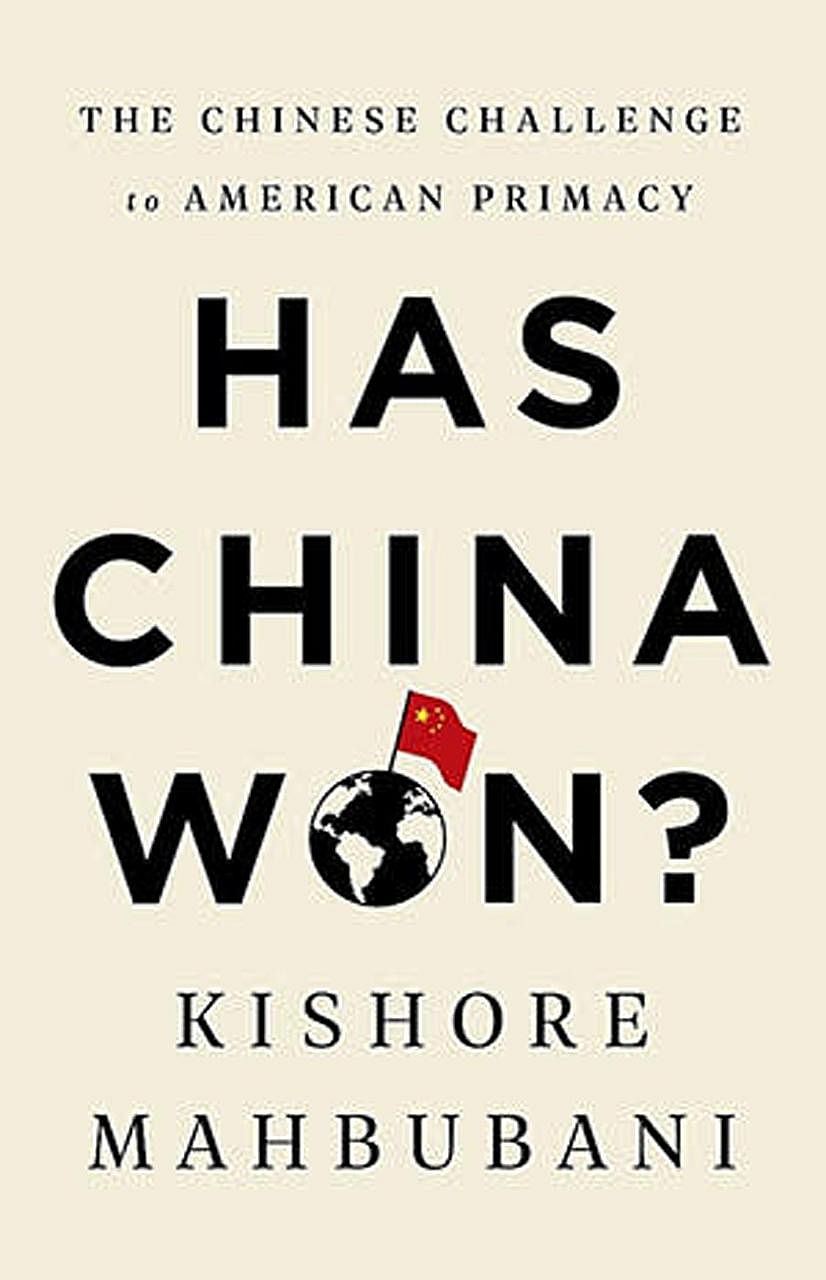NON-FICTION
HAS CHINA WON?
By Kishore Mahbubani
Hachette Book Group/Paperback/ 310 pages/$33/ Available at bit.ly/HCW_KM
4 stars
The geopolitical contest between China and America has in recent years become a theme of feverish speculation among strategic thinkers. It is an intriguing story of many dimensions - economic, ideological, social, technological, military and even philosophical.
The former dean of the Lee Kuan Yew School of Public Policy and prominent intellectual, Kishore Mahbubani has now weighed in with his latest book, Has China Won?.
It is a sweeping, engagingly narrated and unsurprisingly controversial examination of the big issues confronting the two powers.
The title aside, the book is full of pointed and provocative questions. Here are some of the big ones:
• Could America's gross domestic product (GDP) become smaller than China's in the next 30 years?
• Is America's spending on defence excessive and harmful, including to itself?
• Is the US dollar America's "Achilles heel" that China can exploit?
• Should China become a democracy? Does the CCP actually function as the "Chinese communist party" as perceived by Americans?
• Does the US have the strength and stamina to match China's long-term game?
Mahbubani attempts to answer these questions. In the process, he uncovers some hard truths that might be unpalatable to both American and Chinese policy-makers.
STRATEGIC MISTAKES
Both countries have made strategic mistakes, he points out.

For example, the US lacks a coherent strategy on China. With its chaotic and uncoordinated trade measures, it is mistakenly trying to decouple the US and Chinese economies, which, given the extent of China's trade links, "could well result in America decoupling itself from the world".
The Donald Trump administration has divided and polarised America rather than address the challenges posed by China as a united nation.
By alienating its allies and withdrawing from agreements such as the Trans-Pacific Partnership and the global accord on climate change, the US has benefited China and damaged its own standing in the world. And America has squandered close to US$5 trillion (S$7 trillion) on futile wars in the Middle East since 2001, rather than focusing on improving the welfare of its people.
On its part, China has unwisely alienated America's business and political community with some of its trade practices.
It still maintains a "Middle Kingdom mentality", rather than pushing for fair and open economic engagement with the world. Chinese officials displayed "hubris and arrogance" after the global financial crisis of 2008 by treating America as a fallen giant, ignoring the possibility that its economy would make a comeback - which it did.
Most observers of the US-China relationship in both countries would find it hard to disagree with these sharp observations.
QUESTIONABLE ASSERTIONS
However, as his narrative of the geopolitical contest unfolds, Mahbubani makes some questionable assertions.
Take, for instance, the critical issue of comparative economic clout. In speculating whether China will overtake the US, Mahbubani ignores the fact that despite all its economic crises, military misadventures and governance flaws, the US has held on to its roughly 25 per cent share of global economic output since 1980, according to World Bank data.
While China's share has increased dramatically from 1.7 per cent to 15.8 per cent over the period, this has not been at the expense of the US - it is because the share of other countries, such as Japan, Germany and Britain, has fallen.
Moreover, as economist Ruchir Sharma of Morgan Stanley has pointed out, even if the US and China maintain their 2019 growth rates, China would not catch up to the US before 2050.
But in the more likely event that China's economy slows down as it matures, it would be a very different story. Even a one percentage point decline in its growth would mean that China would not catch up to the US until 2090.
Mahbubani also falls into the common trap of comparing the two economies in purchasing power parity (PPP) terms.
Noting that China's PPP-adjusted GDP exceeds that of the US, he says: "Few Americans are aware of this. Fewer still have considered what it means."
Actually, it does not mean a great deal when it comes to comparing global economic influence.
PPP-adjusted GDP is only an indicator of how much of locally produced goods and services people can buy at home, not what they can buy on world markets, which is what really counts when making inter-country comparisons of economic clout.
Those comparisons need to be made in terms of actual market exchange rates. The fact that a country has a larger PPP-adjusted GDP than another does not necessarily make it a more powerful economy.
Also, while Mahbubani rightly highlights many headwinds facing the US economy - among them, its excessive expenditure on defence, which has diverted resources away from domestic needs, and its lapse into self-defeating protectionism - he does not dwell on the challenges facing China's economy.
These include its high domestic debt, which constrains its capacity for fiscal stimulus (unlike in 2008); the ageing of its society - the fact that it will grow old before it grows rich - which is not a problem afflicting the US; and the shift of manufacturing supply chains out of China, which was already under way during the trade war and could accelerate after the Covid-19 economic crisis.
These constraints will make it harder for China to even maintain its growth rate. Nor is the dominance of the US dollar under any threat for the foreseeable future, despite America's misguided attempts to weaponise the currency.
Taking into account all of the above, the prospect of China overtaking the US as an economic power is not a realistic scenario for at least the next 70 years and should be off the table.
WRONG MENTAL MAPS
Mahbubani suggests that in their assessment of China, US policy-makers are mistakenly using the mental maps of the US-Soviet Cold War in characterising the CCP as the "Chinese communist party", rather than the "Chinese Civilisation Party".
He is right to point out that the ideology of Marxism-Leninism has been eroded within the CCP, which has enabled it to preside over a prolonged period of unprecedented prosperity. He is also right to point out that other democracies like India, Indonesia and the countries of the European Union do not feel threatened by Chinese communism.
What he does not mention, however, is that the CCP's Leninist organisational structure has remained intact and, if anything, become stronger. Its domination of the political space enables it to exercise extensive control over large parts of the economy. State-owned enterprises, the banking system and even private companies are subject to party directives.
The CCP's domination also makes it difficult for China to institute the rule of law as opposed to the rule of the party.
Mahbubani does not connect the dots between many of the grievances on China's trade practices held by companies from not only America but also Europe and other countries - which he considers justified - and the CCP's pervasive state control.
A big part of the problem is that foreign investors and recipients of Chinese investment lack the confidence that Chinese companies can resist the directives of the party.
MORE CENTRALISATION
Instead of proposing that the party relax its grip at least on the economy, as many reformers even within China have advocated, Mahbubani seems to favour an even more centralised state.
For example, he enthusiastically supports the removal of term limits on the Chinese presidency, which happened in 2018, going so far as to say the removal "may be the biggest blessing China has had" and "may be one critical reason why China wins the contest against America".
He justifies this on the grounds that China would otherwise descend into chaos - a puzzling rationalisation, given that all of the country's leadership successions so far have been smooth and peaceful and, as he himself argues, China's leadership selection process is meritocratic.
He does not even consider the rationale for term limits that the framers of China's 1982 Constitution - including then leader Deng Xiaoping - had in mind.
While indeed China's current President Xi Jinping is, in striking contrast to his American counterpart, rational, highly revered, a champion of globalisation and not erratic or impulsive, that is not the point.
Term limits were put in place for systemic reasons - to prevent the centralisation of decision making as well as the emergence of personality cults, and to ensure a predictable process of leadership transition.
Mahbubani does not explain why he thinks these concerns are unjustified.
When it comes to US and Chinese involvement in South-east Asia, Mahbubani's views are also mystifying.
While he complains, plausibly, that the US has neglected engaging with economically dynamic Asean, he does no serious examination of China's engagement with the group.
He blames the US navy for provoking China to militarise the South China Sea - an interpretation that would leave many of Asean's foreign ministries aghast. Nor does he, apparently, see anything intrinsically wrong with China pressuring Cambodia to veto a joint Asean statement in 2012, which mentioned the South China Sea, other than that it provided a "huge propaganda coup for America".
While he cites an American analyst as saying that the main message from the Phnom Penh meeting is that "China has decided that a weak and splintered Asean is in its best interests", he leaves his own position on the issue ambiguous.
Many readers might perceive this book as being anti-US or pro-China. This is not the case.
Mahbubani recognises the colossal strengths of the US and offers constructive ideas on how it needs to reorder its domestic priorities and change the lenses through which it views China.
However, other than on trade issues, he is less forthcoming in prescribing what changes China might need to make.
He does not delve into the daunting challenges China's policy-makers may face, such as how they will deal with the problem of ageing, what will happen if they are unable to deliver continued growth and prosperity, and how they would react if the people of Taiwan and Hong Kong feel further alienated from the mainland. These issues are also relevant to the geopolitical contest between the two superpowers.
WIN-WIN COOPERATION
Mahbubani ends his book on a hopeful note, outlining many areas of potential win-win cooperation between China and America.
China could help build America's infrastructure. In their mutual quest for peace and prosperity, the two could work towards a "fusion of civilisations" rather than a clash. And perhaps above all, they could cooperate on the crucial issue of climate change.
At the end of the day, he concludes, the six billion people of the rest of the world expect America and China "to focus on saving the planet and improving the living conditions of humanity... The final question will therefore not be whether America or China has won. It will be whether humanity has won".
So, in the end, Mahbubani comes around to the view that "has China won?" is the wrong question. For reasons set out in this review, it is also premature to ask.
If you like this, read: When China Rules The World by Martin Jacques (Penguin, 2009, $29.96, available at bit.ly/WCRW_MJ), a controversial chronicle of the transformation of China, especially since the global financial crisis, and how it will displace the US as the world's premier superpower.
• This article includes affiliate links. When you buy through affiliate links in the article, we may earn a small commission.


